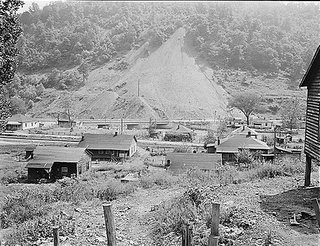Bloody Harlan

A Movie Review
My brother and I both served in the same mission (Tennessee, Knoxville) for The Church of Jesus Christ of Latter-day Saints. I spent just shy of half my field time in the mission serving in the 'Kingsport Zone', I served in every district in that zone except for one, Harlan Kentucky. Well as luck would have it my brother finished off his mission in Harlan and has fond memories of the place. But even before I heard my brothers stories I was well aware of that southern Kentucky countys long and violent (though not always successful) history of union organizing; a history that earned the community the nickname bloody Harlan. (I also served in the areas to the immediate west and east of Harlan so it was hard not to hear about it.)
One of the most interesting union related incidents in the countys history occurred in the middle 1970's, an unusual strike whose events where first widely chronicled in the 1976 documentary Harlan County, U.S.A., a work that is now forever enshrined in the National Film Registry. These events were also depicted in the 2000 Showtime movie Harlan County War, which is the film I am about to review for you now. The film centers on the Kincaid family, Silas Kincaid (Ted Levine) works in the community's barely regulated coal mine and after two young men are killed in front of him in an accident that could have easily been prevented, the hereto loyal employee starts agitating for a new union contract and better safety enforcement on the job. Silas's wife Ruby (Holly Hunter) at first opposes her husbands activity on account of the community being ripped off by some unscrupulous union reps several years earlier (it seems the workers once had a union contract but either lost it or had it gutted).
Stellan Skarsgard is Warren Jakopovich, a Polish-American union representative who manages to get the majority of the minors on board for a strike. (The UMWA by the way pays all the striking family's a $100 per month on which to live while the strike is going on.) After a few months of ineffectual picketing the mines management provoke a fight between the protesters and the local cops and 'skag' workers. Because the county Judge is also part-owner of the mine he uses the incident to limit the amount of picketers at the gate to 'no more then three men'. Now unable to mount any form of forceful resistance it seems as though the strike is doomed to fail, that is until Ruby comes to Warren with an idea. The Judge said that only three 'men' were allowed to pickett, she suggestts organizing the local women into an auxiliary to help the miners by using them to 'man' the pickett line. This proposal is implemented and gets a fair bit of publicity for a while, but as the strike continues to streach month after month many of the men folk are finding their newly assertive women even harder to deal with then the poor mine conditions.
There is little change until Ruby accompanies Warren to New York City and embarrasses company execes at a share holders meeting (Warren bought her a share so she could talk) in the hopes of depressing stock value and thus reviving negotiations. When Ruby returns to Harlan the stakes have been raised by her actions resulting in a state of war in the community, including the fire bombings of workers homes and multiple shootings. When a striking miner is shoot in front of a crowed by a skag worker tired of being harassed the breaking point is reached and the mine and union finally settle on a fair contract. Harlan County War is a good cable TV movie that makes wonderful use of actress Holly Hunters country accent, and I really enjoyed seeing some of 'bloody Harlans' history brought to life on the screen.
- Also seen by me recently: Rooster Cogburn John Waynes second to last film follows the continuing adventures of the character he introduced in his Academy Award winning performance in the 1969 movie True Grit. At the start of the film Ruben 'Rooster' Cogburn is releved of his job as a U.S. Marshell by Judge Parker (John McIntire) for having shoot 64 suspects in his eight years working along the Arkansas/Indian Territory boarder. But no sooner does the Judge dismisses Rooster then he must again ask for his help. A notorious villain named Hawk (Richard Jordan) and his gang have stolen a wagon load of nitro from an army convoy and are planning to use it to rob a train full of gold passing through the neighboring territory. On his way to head off the outlaws Rooster stops at a small Indian mission where he meets Eula Goodnight (Katharine Hepburn) a New England missionary whose preacher father was killed by the gang for opposing their side-business of selling guns and liquor to the Indians. Despite his initial protests Marshall Cogburn is joined on his journey by Ms. Goodnight and an Indian boy (Richard Romancito) named Wolf whose parents were killed by the gang. The movies story its self is really nothing special but the verbal sparing and flirting between Hepburn and Wayne (in there only joint screen appearance) just makes this motion picture.

0 Comments:
Post a Comment
<< Home